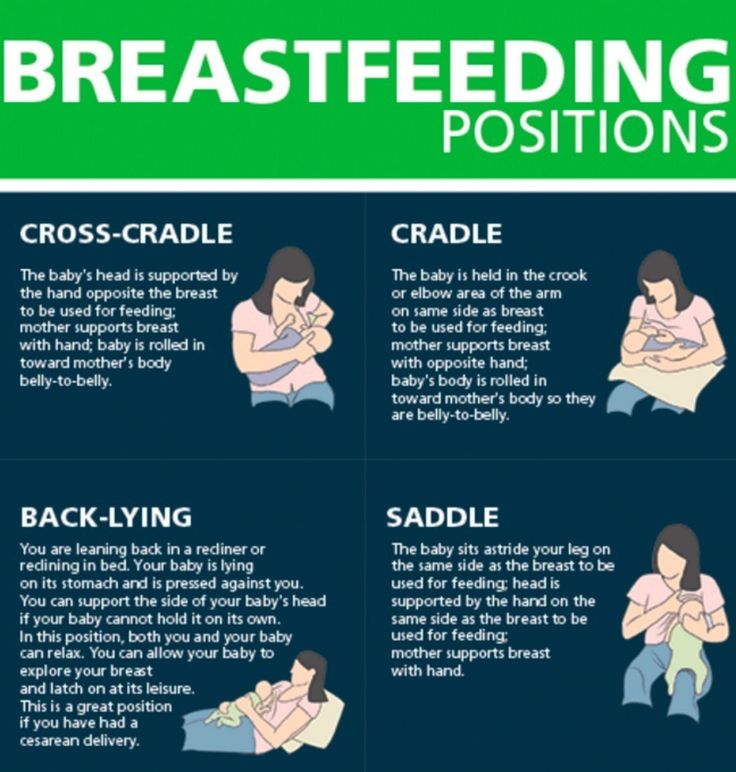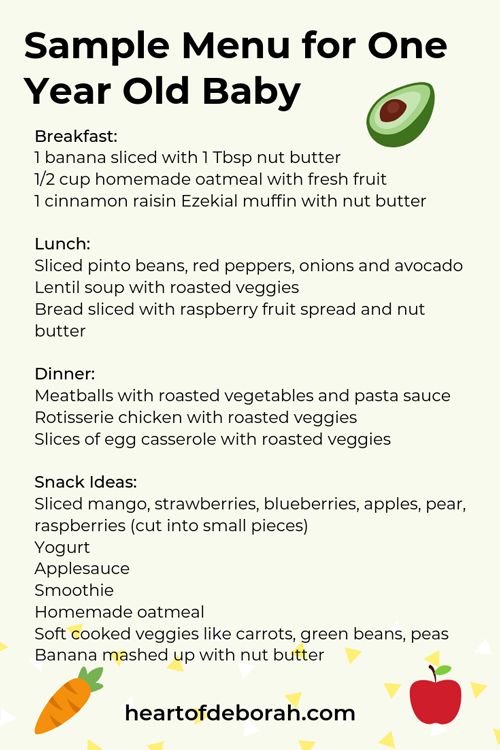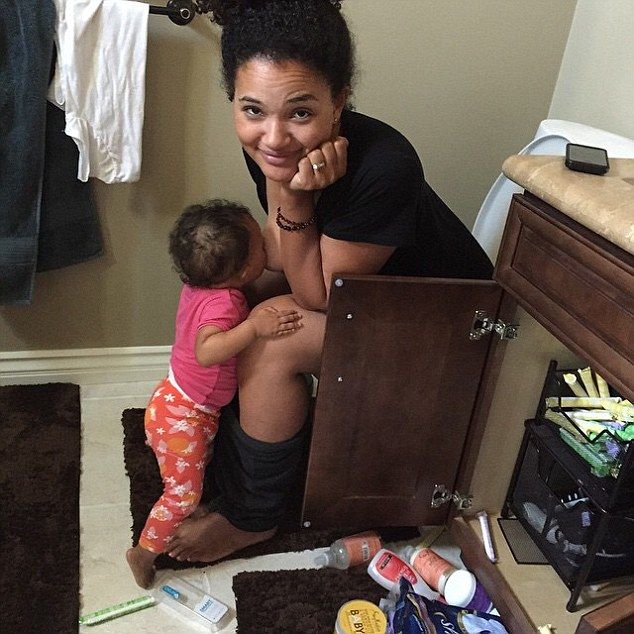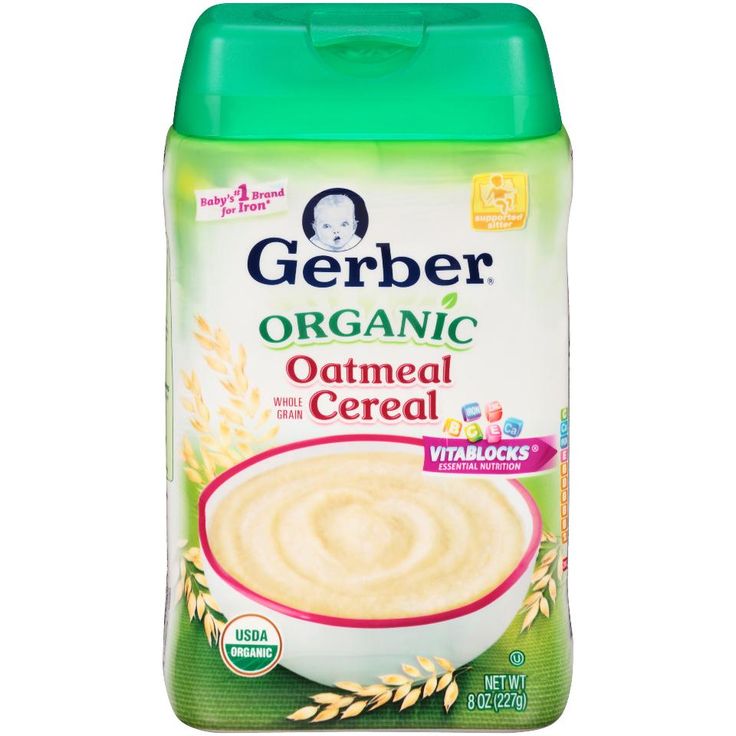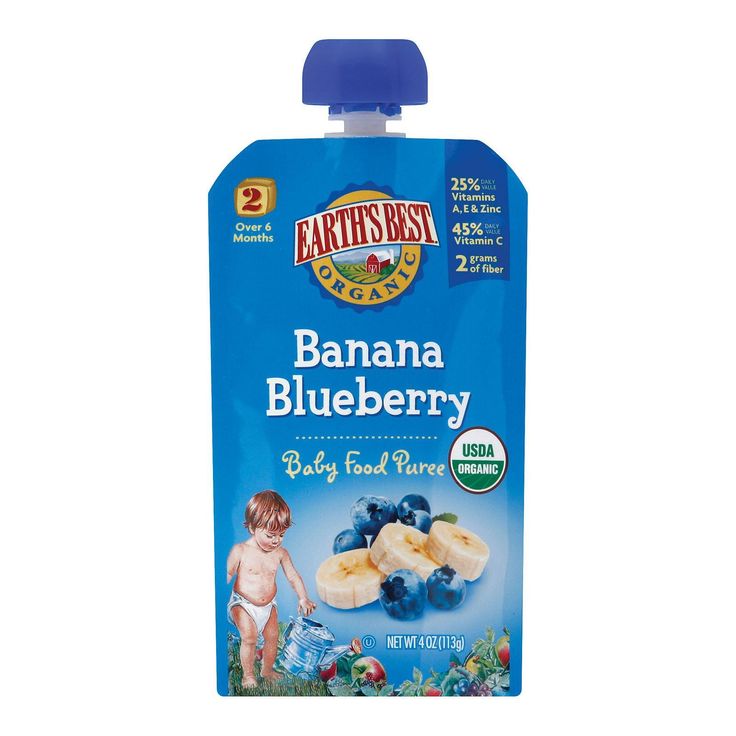Feeding baby solids before bed
Will giving formula or solids at night help baby to sleep better? • KellyMom.com
The idea that solids will help your baby sleep is an old wives’ tale that has been disproven by medical studies. Feeding your baby solids or formula in an attempt to make baby sleep longer is not a good idea for several reasons:
1. There is no evidence that it will help. Some babies will sleep worse, due to reactions to the formula or solids (tummy ache, etc. are not uncommon), particularly if baby is younger than around 6 months. Three studies have indicated that adding solids or formula to the diet does not cause babies to sleep longer. These studies found no difference in the sleep patterns of babies who received solids before bedtime when compared to babies who were not given solids. Here are the studies:
.
Brown A & Harries V. Infant Sleep and Night Feeding Patterns During Later Infancy: Association with Breastfeeding Frequency, Daytime Complementary Food Intake, and Infant Weight.
Breastfeeding Medicine. June 2015, 10(5): 246-252. doi:10.1089/bfm.2014.0153.
Macknin ML, Medendorp SV, Maier MC. Infant sleep and bedtime cereal. Am J Dis Child. 1989 Sep;143(9):1066-8.
Keane V, et al. Do solids help baby sleep through the night? Am J Dis Child 1988; 142: 404-05.
2. Formula requires a baby’s digestive system to work overtime as baby tries to digest something not specific to the human body. Formula is harder to digest than human milk; thus formula-fed babies tend to go longer between feedings (see this page for more on this subject). While this may seem like a benefit, it’s probably not something we want for our babies’ bodies unless there are no other alternatives. There are also risks to formula use (see What should I know about infant formula?). It certainly has a place in infant feeding but probably shouldn’t be used whenever mom’s milk – either directly from the source or expressed – is available.
3.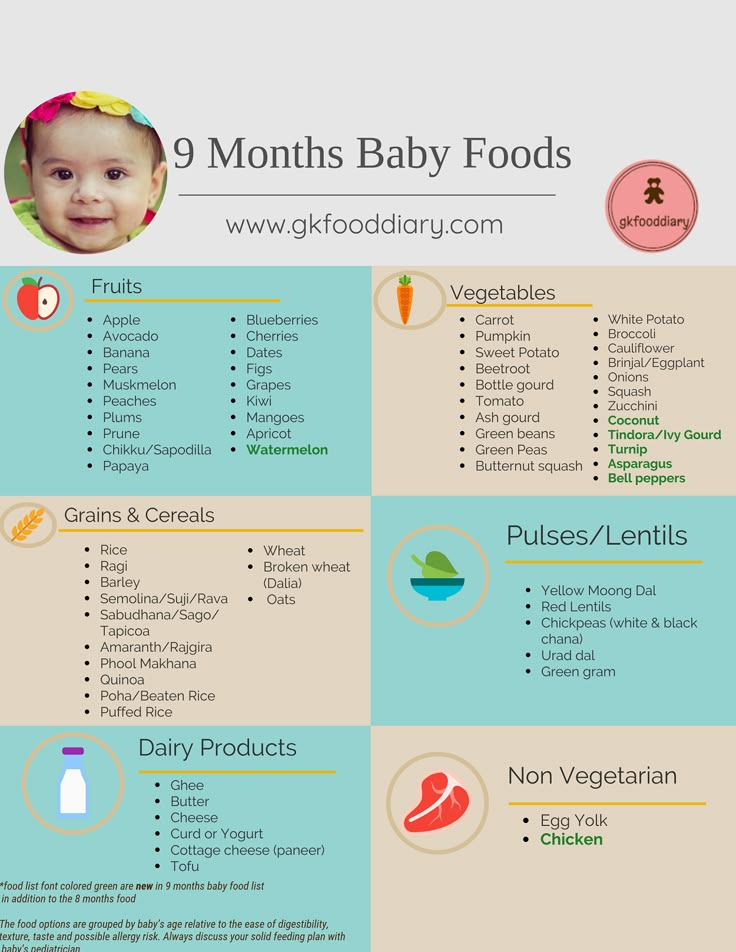 Early introduction of solids (before six months) carries its own set of risks.
Early introduction of solids (before six months) carries its own set of risks.
4. Recent research suggests that longer stretches of deep sleep are associated with sudden infant death syndrome (SIDS) and babies who sleep longer/deeper may be more vulnerable to SIDS (see in particular the research of James McKenna, PhD). Some scientists are saying that it appears that long sleep stretches are not “natural” for human infants and that sleep interruptions in the early months may provide a protective factor against SIDS. More research is needed on this subject, but parents might want to think twice about significantly manipulating baby’s natural sleep pattern in the early months.
A little more about feeding baby cereal from a bottle…
Doctors and other experts recommend that you never give baby cereal in a bottle unless recommended by baby’s doctor for a specific medical condition. Here are some of their reasons:
- It is a choking hazard.

- The cereal takes away from the amount of milk in the bottle (adds carbohydrates and dilutes the nutrient density), and baby may not get adequate milk volume for proper growth and development.
- Baby is being given a higher concentration of calories without being able to regulate her own intake. This can lead to weight problems in the future.
If baby’s doctor suggests thickened feedings for reflux, consider asking about alternatives, as many doctors question this practice and it has the potential to cause more harm than good.
Additional information
I have heard different reviews about putting cereal in the bottle of an infant. Is it safe? by Dr. Alan Greene
Will my baby sleep better if I add cereal to her bottle at night? by Jan Barger, RN, MA, IBCLC
Sleeping through the night @
Other sleep articles @
Do Solids Help Babies Sleep?
Many parents have questions about starting solids and wonder how starting solids might impact their baby's sleep.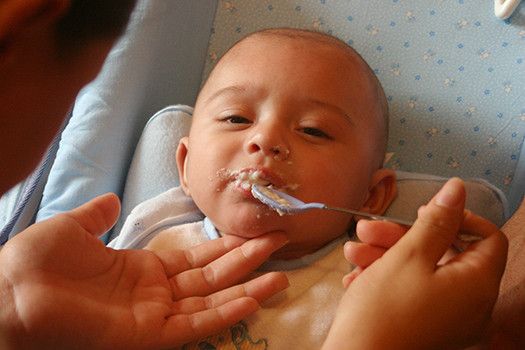 Let's discuss the most common questions about introducing solids to your baby and how it affects sleep.
Let's discuss the most common questions about introducing solids to your baby and how it affects sleep.
Will starting solid foods help my baby sleep better?#
Many hopeful parents truly believe that starting solids will be the turning point for those tough nights. However, research doesn’t support a significant connection between beginning solids and babies sleeping through the night. Adding cereal to a bottle, beginning solids before a baby is ready, or stuffing them full of food is NOT the solution to long, restful nights. In fact, studies show us that these three things can actually cause a disruption of sleep instead.
Please know, calories are an important component of restful nights, but adding solids is not the “fix” for most who are struggling with night sleep. Baby sleep is about so much more than just the fullness of a tummy.
How do I know if starting solids is causing problems with my baby’s sleep?#
For little ones who have a strong sleep foundation, adding solids usually does not derail sleep. But what should you do if nights suddenly become disrupted after beginning solids?
But what should you do if nights suddenly become disrupted after beginning solids?
Ask yourself these questions:
1. Are solids replacing necessary milk intake?#
Understand that, during the first year, breast and bottle feeding is the main source of calories. Exposure to solids should never replace full breast/bottle feedings. If solids begin to replace milk intake, your baby may not get enough calories during the day, causing them to wake during the night.
This doesn’t mean you need to limit your baby’s solids, but instead try to follow these guidelines:
Avoid rigid feeding schedules.
Always be responsive to a baby’s hunger cues by offering the breast or bottle every 2.5 - 3.5 hours during the day on a flexible feeding schedule.
Offer solids 30-90 minutes after breast/bottle feedings.
Your sample schedule when introducing solids to a 6 month old could look like this:
*Please don’t try to replicate this schedule exactly.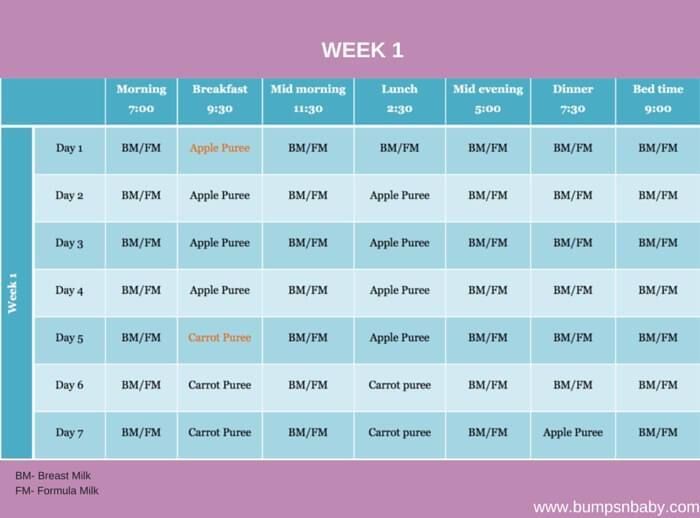 Always be responsive to your baby’s hunger cues as you fit necessary feedings around nap times. The time of day when you offer solids can be whatever best fits your lifestyle and your baby’s temperament – in the morning, afternoon, or evening.
Always be responsive to your baby’s hunger cues as you fit necessary feedings around nap times. The time of day when you offer solids can be whatever best fits your lifestyle and your baby’s temperament – in the morning, afternoon, or evening.
Your daytime routine for a 7-9 month old could look like this:
*Please don’t try to replicate this schedule exactly. Always be responsive to your baby’s hunger cues as you fit necessary feedings around nap times. The time of day when you offer solids can be whatever best fits your lifestyle and your baby’s temperament – in the morning, afternoon, and/or evening.
2. Is my baby experiencing physical discomfort after a new food is introduced?#
Don’t let this question alarm you. If your doctor has given you the "all clear" for solids, please don't let the fear of allergies or physical discomfort keep you from offering new foods.
Instead, watch for these things:
Allergic reaction: Speak with your doctor or get medical attention regarding any signs of allergies to food (itchiness, swelling, etc.
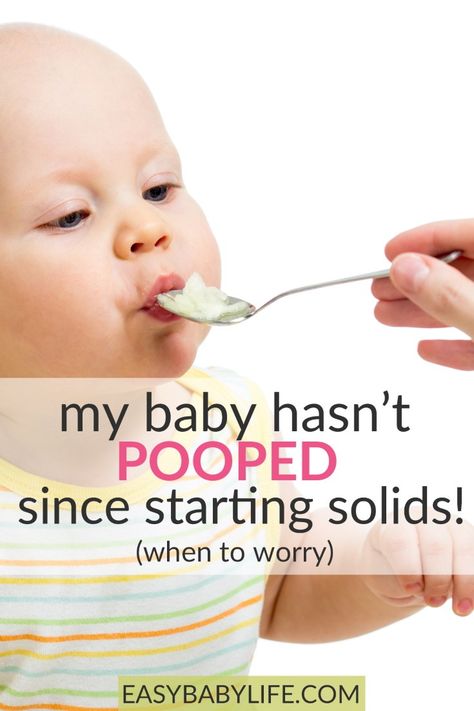 ). The AAP encourages introducing new food options to your baby one at a time and watching for their reaction. This will help you to identify possible allergies. (Please know that avoiding high allergen foods is no longer recommended after 6 months.)
). The AAP encourages introducing new food options to your baby one at a time and watching for their reaction. This will help you to identify possible allergies. (Please know that avoiding high allergen foods is no longer recommended after 6 months.)Constipation: As we begin introducing solids, a baby’s digestive tract may need a bit of time to adjust, and for some, this can impact sleep. You may find your little one has bowel movements less frequently than before and/or the stool is more formed. This is normal and shouldn’t impact sleep. If your baby is experiencing pain and a firm belly (possible constipation), this should prompt you to contact your doctor.
More frequent bowel movements: Some foods may cause your baby to have more frequent bowel movements. When these poops occur at night or during the early morning hours, it will impact sleep. Simply keep track of what your little one ate and at what time. Try moving those specific foods earlier in the day.
 This issue typically resolves fairly quickly as your baby becomes more accustomed to eating solids.
This issue typically resolves fairly quickly as your baby becomes more accustomed to eating solids.
Expert Tip: Once your baby reaches 6 months of age, be sure you are offering a couple of ounces of water in a cup as you offer solids too. (The AAP recommends waiting until 6 months to offer water and no more than 8 ounces of water per day for babies 6-12 months.)
3. Could something else be causing new sleep struggles?#
At the same time solids are being introduced, babies are facing huge developmental strides including: increasing mobility, expanding interest in the world around them, and changing sleep needs. Although it can look like introducing solids caused a sleep disturbance, this is often coincidental. Truly, your rough nights may have nothing to do with beginning solids.
If solids won’t fix sleep, how can I help my baby sleep better?#
Here are a few of the elements vital to restful baby sleep:
1.
 Age-appropriate daytime schedule#
Age-appropriate daytime schedule#Consolidated night sleep is directly impacted by what happens during the daytime. It’s important to have active awake-time, developmentally appropriate stimulation, and plenty of rest during the day too. (Yes, naps actually do help babies sleep better at nighttime.) Finding a flexible schedule that is age-appropriate will set your nights up for success.
2. Consistent bedtime routine#
In the 30 minutes prior to bedtime, offer a consistent bedtime routine that helps calm your baby and prepare for sleep. It doesn’t have to be complicated. It just needs to be the same activities in the same order each night. For example: change into jammies, offer breast or bottle feeding, read a book, sing a song, and put down into the crib.
3. Environment conducive to sleep#
Make sure your baby is wearing comfortable clothing, has an environment that is slightly cooler (but not cold), is using a sound machine, and has a dark room.
4. Ability to fall asleep independently at bedtime and throughout the night#
Having the ability to fall asleep at bedtime without being fed, rocked, or bounced to sleep is the building block for great nights. Why? Because no one actually sleeps through the night. We all awaken multiple times a night (often without even knowing we are awake).
The key to having long, consolidated nights is the ability to connect sleep cycles by putting ourselves BACK to sleep after these wakings. Babies have to learn to do the same, and it all starts by falling asleep independently.
5. Adequate daytime calories#
We know that hungry babies don’t sleep well, and sleepy babies don’t eat well! Feedings and sleep are truly connected, so we always want to be responsive to a baby’s hunger cues. What does that mean? If your baby is hungry – feed them! During the first year of life, the majority of a baby’s calories should come from breast milk or formula, so we want to provide those full feedings every 2. 5-3.5 hours during the day.
5-3.5 hours during the day.
6. Solution to reverse cycling#
Often, exhausted parents are searching for a quick solution to get babies back to sleep at night. For many, breast or bottle feeding is their go-to response. However, more night feedings can result in a baby who simply isn’t hungry during the day but takes more feedings at night. The cycle repeats, and you have a legitimately hungry baby at night who doesn’t eat well during the day. The answer to breaking this cycle is to gradually wean night feedings so that your baby shifts all (or at least most) needed calories to the daytime.
7. Plan for teaching your baby to sleep#
If your baby is missing one of these elements, baby sleep can be so tough. Please know, help IS available. My 5–24 Month Collection will give you a step-by-step plan to 10-12 hour nights in the crib. These classes will cover bedtime, night wakings, night weaning, and naps through the first two years of life. You’ll have a plan to follow anytime sleep is disrupted: through regressions, teething, illnesses, and setbacks too.
You’ll have a plan to follow anytime sleep is disrupted: through regressions, teething, illnesses, and setbacks too.
Breastfeeding after 1 month: what to expect
Do you know when breast milk production stabilizes? And how does the frequency and duration of feedings change as the baby grows? You will find answers to these questions in our recommendations for breastfeeding after the first month.
Share this information
Congratulations: You made it through the first month of breastfeeding. Your breast milk has reached full maturity 1 , its production stabilizes, and it leaks almost or not at all from the chest. Don't worry, it's not getting less milk, it's just that your breasts are better able to produce and store it now. 2 At the age of six weeks, your baby will begin to please you with his charming toothless smiles, and by two months you will already have 500-600 feedings behind you.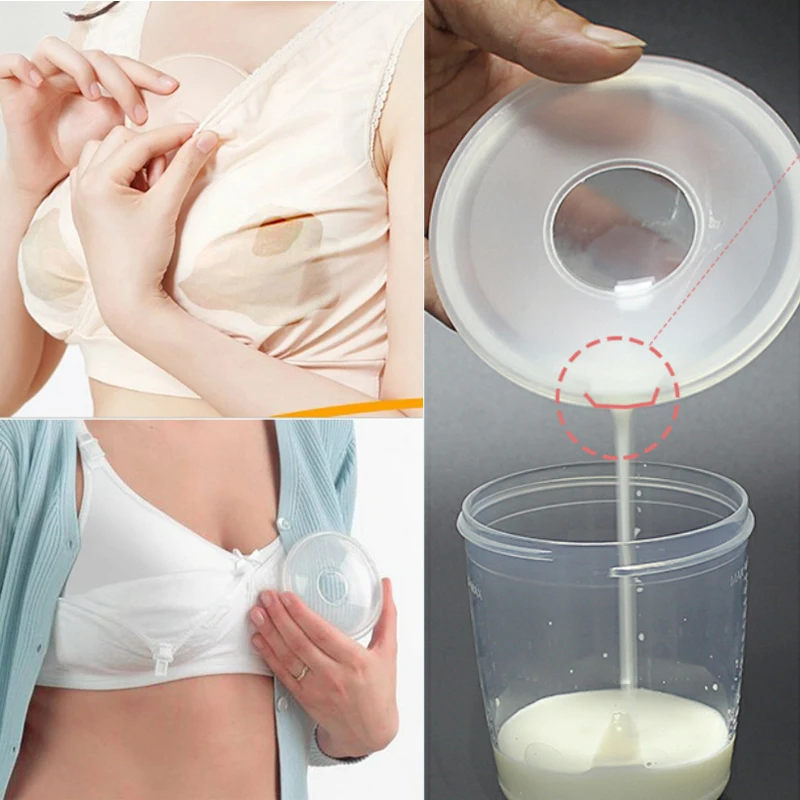 With a favorable development of events, problems with latch on by this point will already be resolved, and you can simply enjoy the convenience and benefits of breastfeeding. nine0003
With a favorable development of events, problems with latch on by this point will already be resolved, and you can simply enjoy the convenience and benefits of breastfeeding. nine0003
When does breastfeeding decrease?
"Normal" feeding frequency for babies aged one to six months varies considerably, with some needing four feedings a day, others asking to be breastfed 13 times a day. 3
“From the age of one month, the amount of milk a baby consumes per feed increases, so that he can go without food for longer,” explains Cathy Garbin, a recognized international expert on breastfeeding, “A baby’s stomach grows, so he eat more at one time. In addition, mature milk allows him to stay full longer.” nine0003
Feeding can last from 12 minutes to one hour -
the habits of babies vary so much! 3 But if the child is gaining weight and falls within this range, there is no cause for concern.
What is most surprising, no matter how often the baby eats, he consumes approximately the same amount of milk per day - both at one month and at six, when it is time to start complementary foods with solid food. 4
4
“However, sometimes the baby eats more and sometimes less, especially when he is unwell. It’s better to just listen to his needs,” Katie explains. nine0003
Is breast milk enough for the first six months?
Yes. Breast milk contains everything a baby needs for the first 90,023 six months of life—exclusively breastfed babies don't even need to drink more water! 5 Until about six months of age, a child's digestive system is simply not adapted to the digestion of solid food, and he will be able to drink cow's milk only after a year.
In addition, breastfeeding during this period prepares the child for further development. It strengthens the muscles of the mouth, develops the jaw and helps straighten the teeth 6.7 . All this will come in handy when the baby begins to eat and talk. And because what you eat and drink affects how your breast milk tastes, your baby discovers new tastes even before he starts eating solid foods.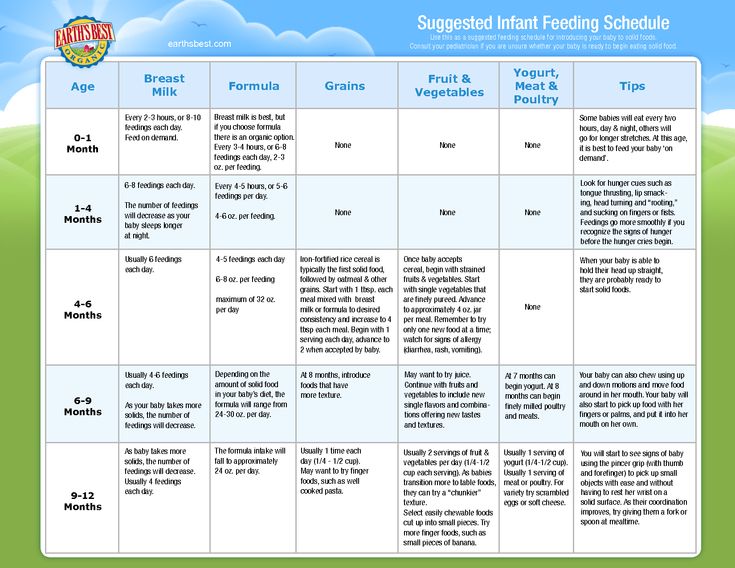 8
8
In addition, when your baby is sick, your body produces breast milk that is
rich in antibodies that help fight infection. 9 In other words, milk continues to protect the baby for many months as he grows and becomes more active. nine0003
Breastfeeding is also very comfortable once you get used to it. Claudia, a mother of two from the UK, notes: “No need to sterilize a mountain of bottles, prepare formula, carry it all with you, warm it up - in general, breastfeeding turned out to be very convenient, especially when my babies grew up and we began to leave the house more often. ".
At what age does a breastfed baby start sleeping through the night?
Waking up at night is normal for babies. Most babies between the ages of one and six months consume a fifth of their daily milk requirement at night, so nighttime feedings should not be neglected if you want your baby to get the required amount of calories. nine0009 3
"It really depends on what you mean by 'sleep through the night'," says Cathy.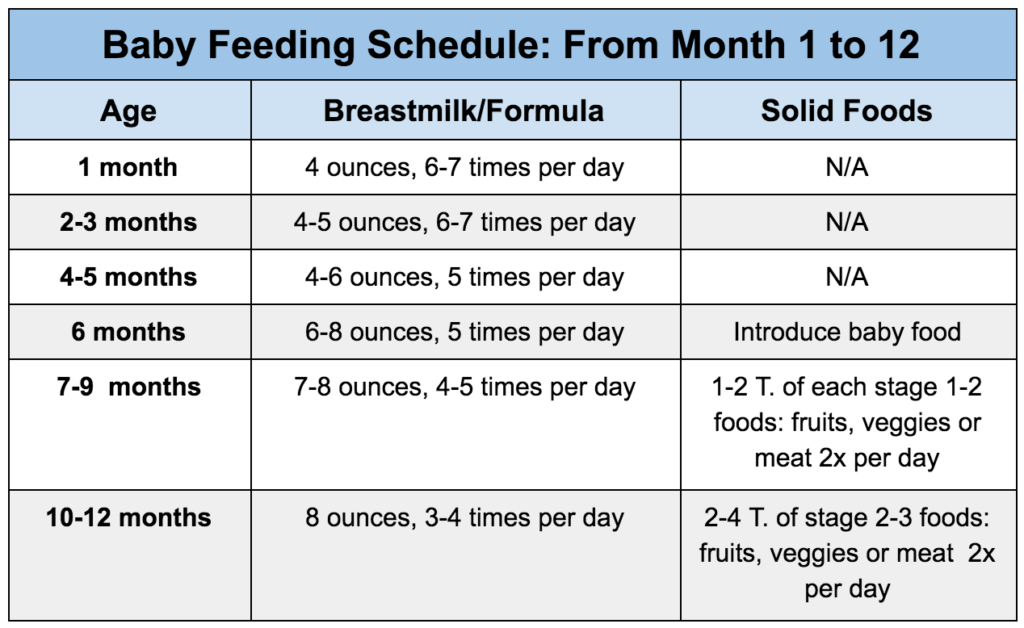 "And it's better than waking up every two hours anyway! I have met infants who, starting at six weeks old, fell asleep at 19:00 and woke up at 7:00, but most continue to wake up frequently at night after this age. All children are different."
"And it's better than waking up every two hours anyway! I have met infants who, starting at six weeks old, fell asleep at 19:00 and woke up at 7:00, but most continue to wake up frequently at night after this age. All children are different."
In Wales, a study of more than 700 infants showed that almost 80% of children aged 6 to 12 months wake up at least once a night, and 25% of them wake up three times or more. And it did not depend on what type of feeding the child is on - breastfeeding or artificial. nine0009 10
And if nighttime awakenings are unavoidable anyway, breastfeeding is at least comfortable! Maina, a mother of two from Australia, agrees: “You can even take a nap while feeding in the middle of the night - both the body and the baby do their job on autopilot. No need to plan, measure, sterilize anything - ready-made food at the right temperature is right in your chest. I think it's ideal."
My child wakes up more often. Perhaps he is hungry?
Around four months of age, a baby's sleep patterns change as they develop deep and light sleep phases like an adult.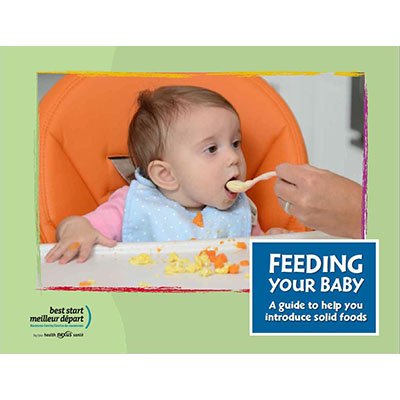 Because of this, he may wake up more often at night. “At four months, sleep is more of a problem than feeding,” Cathy admits. “It can be exhausting, but try to adapt and be patient.” nine0003
Because of this, he may wake up more often at night. “At four months, sleep is more of a problem than feeding,” Cathy admits. “It can be exhausting, but try to adapt and be patient.” nine0003
Some call this " a four-month sleep regression ", but "progress" is more appropriate here. From the outside it may look like a step back, but in fact the child is approaching an important stage of development. He learns quickly, begins to become aware of the world around him, his perception is sharpened and, perhaps, there is anxiety about being separated from his mother. Crying when waking up and being able to eat milk cuddled up to mommy’s chest is a way for a baby to calm down. nine0009 11–13
Resist the urge to “supplement” your baby with formula or start solid foods early
in an attempt to improve his sleep. Breast milk contains
hormones that make you sleepy and help you both relax
. Research shows that breastfeeding mothers actually sleep longer at night than mothers of formula-fed or mixed-fed babies
. 14
14
How does teething affect breastfeeding?
Teething usually begins around four months of age. When a baby has gum pain, he becomes restless, throws his chest and cries. All this, of course, is unpleasant.
However, breastfeeding can be an excellent sedative.
Studies have shown that babies who are breastfed
during the vaccination period cry less and forget pain more quickly. 15 Breastfeeding during teething can have the same calming effect. nine0003
An unpleasant side effect may be the child's attempts to try out his new teeth on the mother's breast. “Sometimes children flirt and bite their mother’s nipples. This can be felt in advance by how the behavior of the child changes when feeding: before biting, he removes his tongue, explains Cathy, “Usually this is not a problem and only happens a couple of times. It is enough to stop feeding, affectionately say that biting is not good, and the baby will soon leave this fun.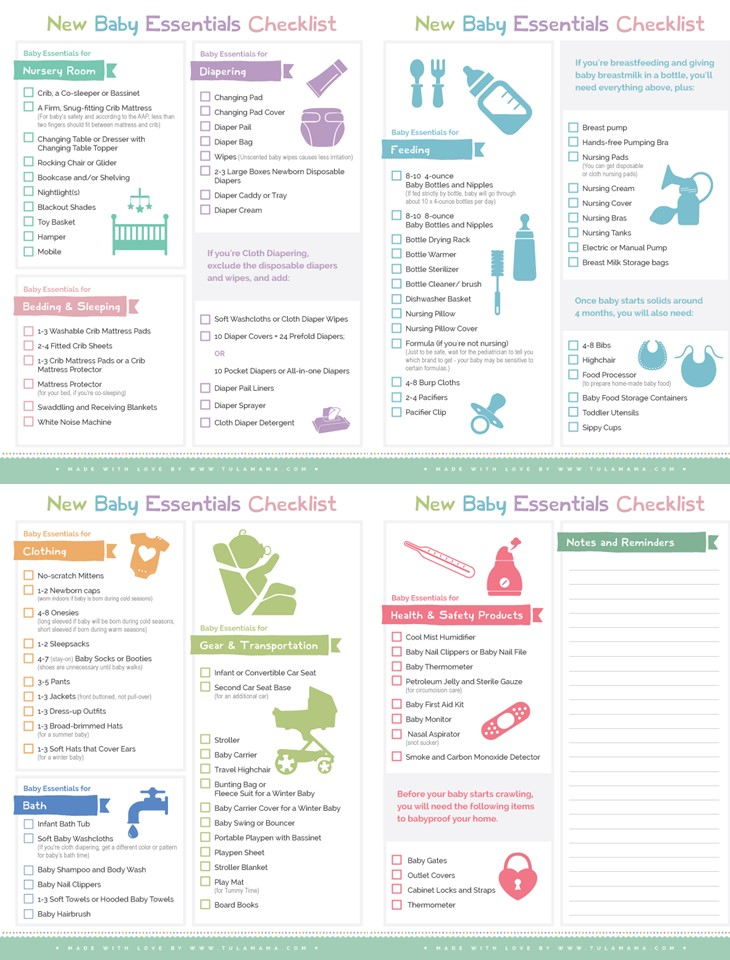
How to continue feeding if you have to be separated from the baby? nine0015
It happens that during the first six months, when the baby is still fully breastfed, the mother needs to be away for several hours - or even longer if she has to go to work or go away on business for a couple of days.
But this does not mean that you should stop breastfeeding. You can still feed your baby healthy breast milk - just express it and have someone give it to your baby when you're away. Here's Katie's advice:
“Start expressing milk a couple of days in advance, in small batches, 40-60 ml at a time. So you will have the necessary supply for the time of your absence, but at the same time the amount of milk produced will remain the same. nine0003
If you have to return to work, check with your employer about your daily schedule. Many mothers breastfeed their babies in the morning, evening and night, and pump milk at lunchtime to relieve discomfort and create a reserve for the next day.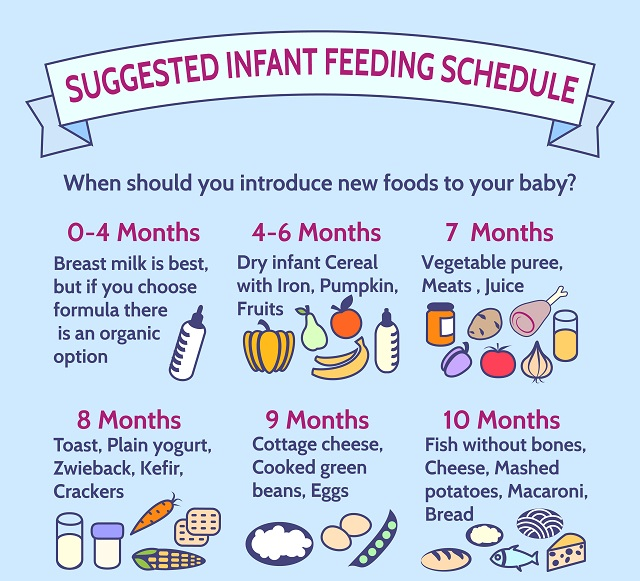
This usually turns out to be much easier than one might think, and today many companies are well placed to do this, notes Cathy. “Breast pumps make it easy to solve this problem.”
Natalie, mother from the USA, shares her experience: “I feed Dylan as soon as he wakes up, and sometimes again before leaving for work, in order to maintain milk production and not lose contact with the child. At work, I pump twice the next day (in my absence, he eats two bottles of breast milk), and after work I rush home for the evening feed. I don't pump on the weekends - we resume regular breastfeeding." nine0003
Can breastfeeding continue after the introduction of solid foods?
When your baby begins to show interest in food and can sit up on his own - usually around six months of age - it's time to start solid foods. However, it is not necessary to stop breastfeeding, Cathy explains: “A baby’s iron stores during pregnancy are depleted by six months, so he needs additional sources of this element.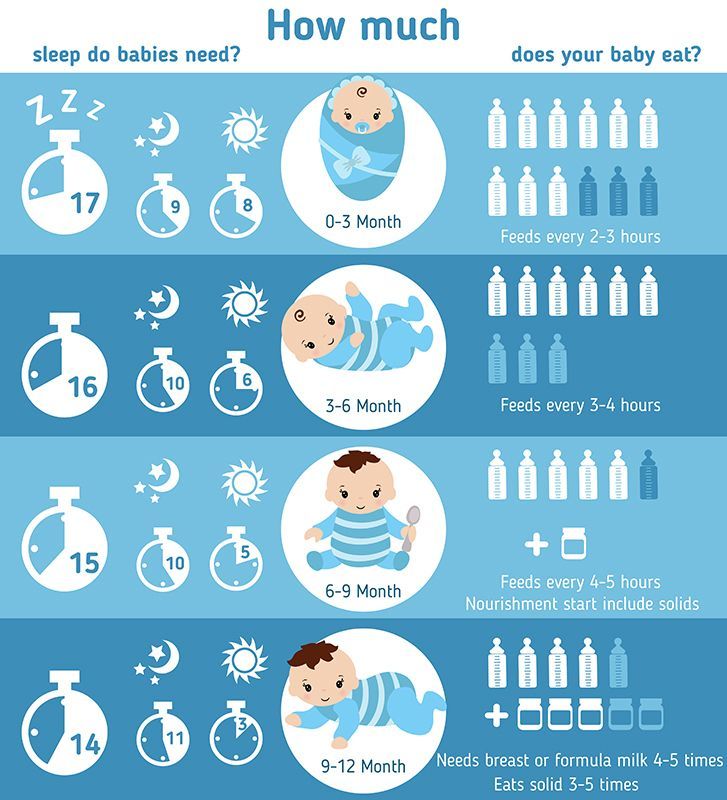
Start complementary foods with solid foods, but remember that breast milk remains a more important source of calories and nutrients until the baby is eight to nine months old. By this time, he will be eating much more solid food, but he will still need to breastfeed four to five times a day. By 12 months, the frequency of feeding may be two to six times a day. All babies are different, and many of them at this age are still getting half their daily calorie intake from breast milk.” nine0003
Don't forget that breast milk can be added to solid foods, such as cereals and purees, so that the baby can taste the familiar taste. If possible, use milk expressed just before feeding (not thawed) and add just before serving to keep bacteria and nutrients alive. 16
You may be pressured by others to stop breastfeeding when your baby is six months old, but the longer you breastfeed or pump milk, the better for you and your baby. nine0003
How long can I continue breastfeeding?
“The World Health Organization recommends breastfeeding along with solid foods until at least two years of age because it plays an important role in supporting immunity,” says Cathy.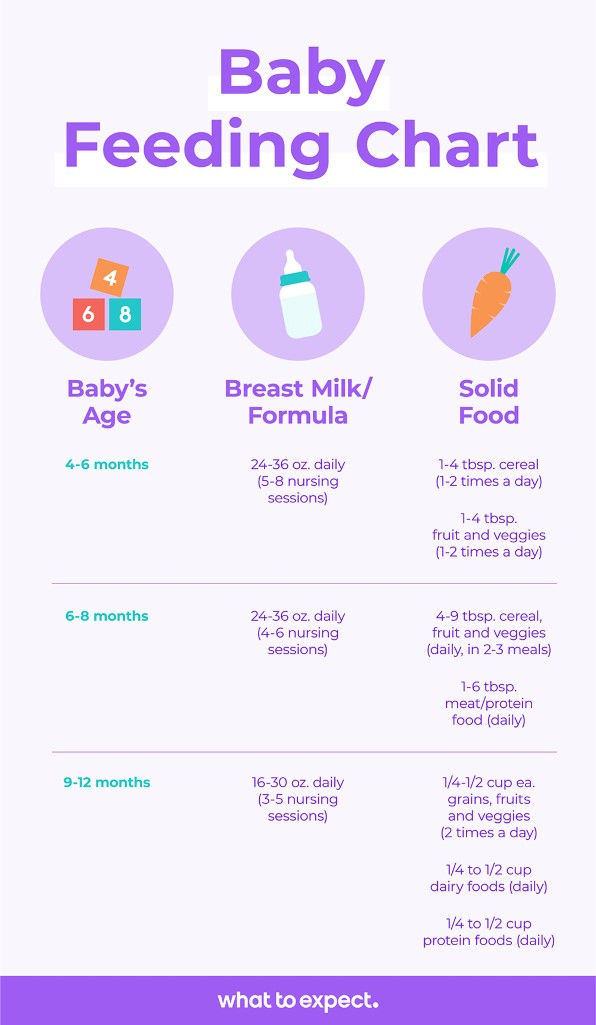 feels bad".
feels bad".
At eight months, the baby sometimes breastfeeds four times a day, but by one year old, the frequency of feedings can be reduced to two times a day. You yourself will understand which feeding regimen is more suitable for you and your baby. For example, Jane, a mother of two from the US, breastfed until the age of two: “I breastfed when I was at home - in the evenings and on weekends, when the children wanted to be close to me,” says Jane, “It helped a lot when they were sick . Breastfeeding has become my favorite form of comfort." nine0003
“When my son got a little older and bolder, he still often asked me to breastfeed him - as if to calm down and gain strength,” recalls Amy, a mother of two children from Canada, “When he happened to hit or skin his knee , breastfeeding was a wonderful way to comfort him.”
If your baby is over a year old and you are still breastfeeding, people around you will probably tell you that this way he will never wean. But if children are not pressured, they usually refuse to breastfeed themselves between the ages of two and four. nine0009 17
nine0009 17
“I didn’t intend to breastfeed for so long, but as a result, I still breastfeed my four-year-old daughter and 22-month-old son,” says Suzanne, mother of two from the UK, “I breastfeed my youngest before and after work, and in I express milk on business trips. The eldest daughter likes to breastfeed a little before bed or when she is upset - this is a great way to make contact. When I get tired of it, I remind myself what great benefit and comfort it brings them. I now plan to pursue a baby-initiated end breastfeeding strategy — let them decide when to stop.” nine0003
For more information on what to expect and lots of tips and tricks, see our guide Breastfeeding Problems After the First Month.
Literature
1 Ballard O, Morrow AL. Human milk composition: nutrients and bioactive factors. Pediatr Clin North Am . 2013;60(1):49-74. - Ballard O., Morrow A.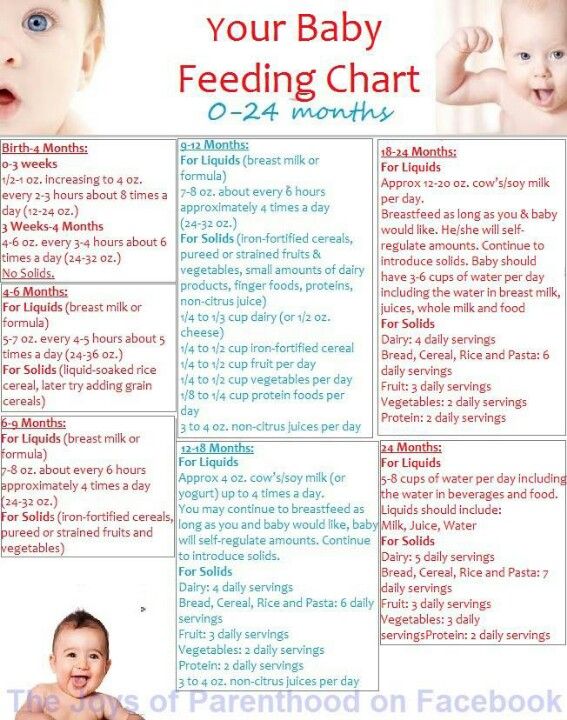 L., "Composition of breast milk: nutrients and biologically active factors." nine0073 Pediatrician Clean North Am. 2013;60(1):49-74.
L., "Composition of breast milk: nutrients and biologically active factors." nine0073 Pediatrician Clean North Am. 2013;60(1):49-74.
2 Kent JC et al. Principles for maintaining or increasing breast milk production. J 2012;41(1):114-21. - Kent J.S. et al., "Principles for Maintaining and Increasing Milk Production". J Obstet Ginecol and Neonatal Nurse. 2012;41(1):114-121. nine0073
3 Kent JC Volume and frequency of breastfeedings and fat content of breast milk throughout the day. Pediatrics. 2006;117(3): e 387-395. - Kent J.S. et al., "Amount and frequency of breastfeeding and fat content of breast milk during the day." Pediatrix (Pediatrics). 2006;117(3):e387-95.
4 Kent JC et al. Longitudinal changes in breastfeeding patterns from 1 to 6 months of lactation. Breast Med .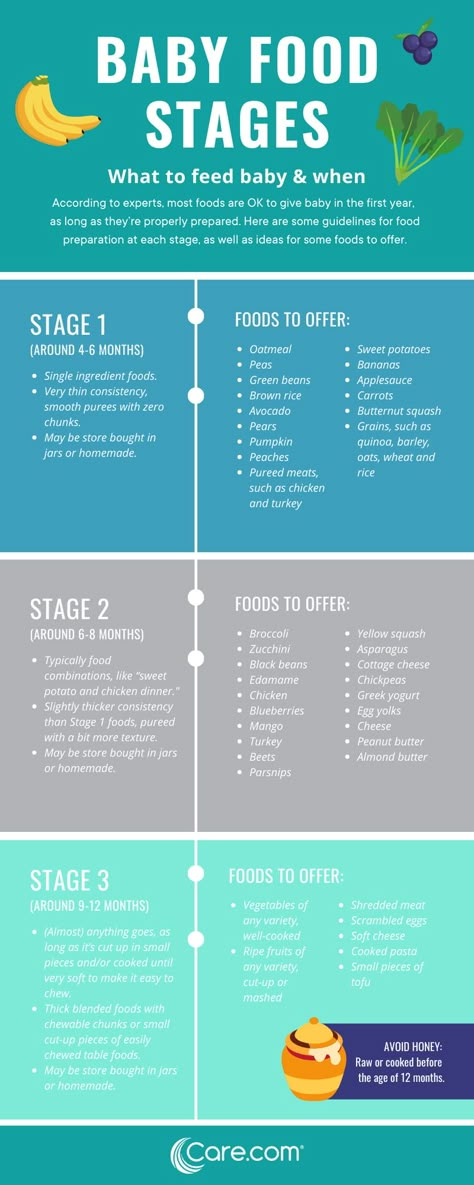 2013;8(4):401-407. - Kent J.S. et al., Longitudinal changes in breastfeeding patterns from 1 to 6 months of lactation. Brest Med. 2013;8(4):401-407.
2013;8(4):401-407. - Kent J.S. et al., Longitudinal changes in breastfeeding patterns from 1 to 6 months of lactation. Brest Med. 2013;8(4):401-407.
5 Almroth S, Bidinger PD. No need for water supplementation for exclusively breast-fed infants under hot and arid conditions. Trans R Soc 1990;84(4):602-604. - Elmroth S., Bidinger P.D., "No need for supplementation of exclusively breastfed infants in hot, dry conditions." Trans R Sots Trop Med Hyg. 1990;84(4):602-604.
6 Victora CG et al . Breastfeeding in the 21st century: epidemiology, mechanisms, and lifelong effect. Lancet. 2016;387(10017):475-490. - Victor S.J. et al., "Breastfeeding in the 21st century: epidemiology, mechanisms and long-term effects". Lancet 2016;387(10017):475-490.
7 Peres KG et al. Effect of breastfeeding on malocclusions: a systematic review and meta - analysis. Acta Paediatr. 2015;104( S 467):54-61. - Perez K.G. et al., "The impact of breastfeeding on malocclusion: a systematic review and meta-analysis". Akta Pediatr. 2015;104(S467):54-61.
Effect of breastfeeding on malocclusions: a systematic review and meta - analysis. Acta Paediatr. 2015;104( S 467):54-61. - Perez K.G. et al., "The impact of breastfeeding on malocclusion: a systematic review and meta-analysis". Akta Pediatr. 2015;104(S467):54-61.
8 Mennella JA, Beauchamp GK. Maternal diet alters the sensory qualities of human milk and the nursling's behavior. Pediatrics. 1991;88(4):737-744. - Mennella, JA, Beauchamp, GK, "Maternal nutrition influences the organoleptic properties of breast milk and infant behavior." nine0073 Pediatrix (Pediatrics). 1991;88(4):737-744.
9 Hassiotou F et al. Maternal and infant infections stimulate a rapid leukocyte response in breastmilk. Clin Transl immunology. 2013;2(4). - Hassiot F. et al., "Infectious diseases of the mother and child stimulate a rapid leukocyte reaction in breast milk.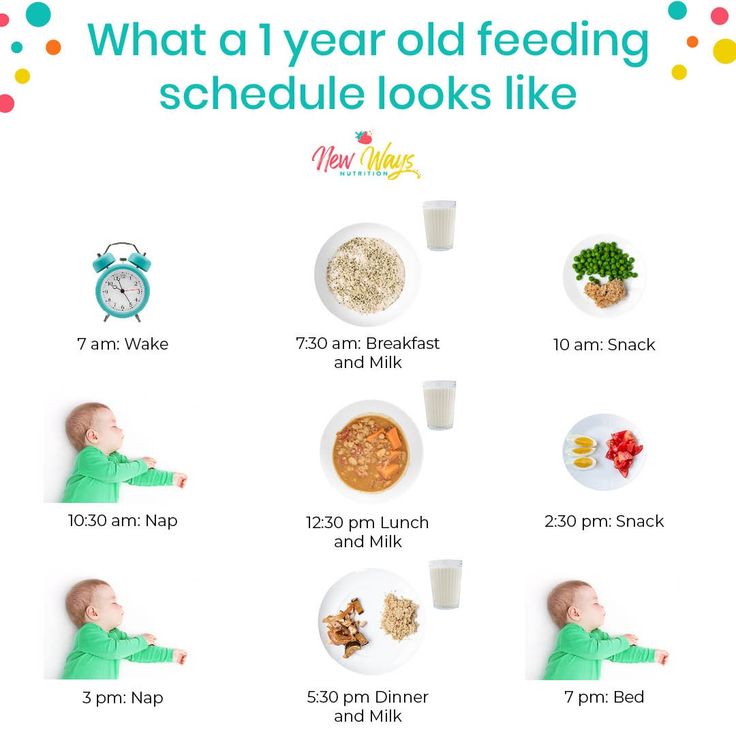 " Clean Transl Immunology. 2013;2(4).
" Clean Transl Immunology. 2013;2(4).
10 Brown A, Harries V. Infant sleep and night feeding patterns during later infancy: Association with breastfeeding frequency, daytime complementary food intake, and infant weight. Breast Med . 2015;10(5):246-252. - Brown A., Harris W., "Night feedings and infant sleep in the first year of life and their association with feeding frequency, daytime supplementation, and infant weight." Brest Med (Breastfeeding Medicine). 2015;10(5):246-252.
11 Infant sleep information source. [Internet]. Normal Infant Sleep Development; December 2017 [cited 2018 Feb] - All about baby sleep. [Internet] "The development of normal sleep in a child", December 2017 [cited February 2018]. nine0073
12 Baby sleep science. [Internet]. The-Four-Month-Sleep-Regression-What-is-it-and-What-can-be-Done-About-it. March 2014 [ cited 2018 Feb ] - The science of baby sleep.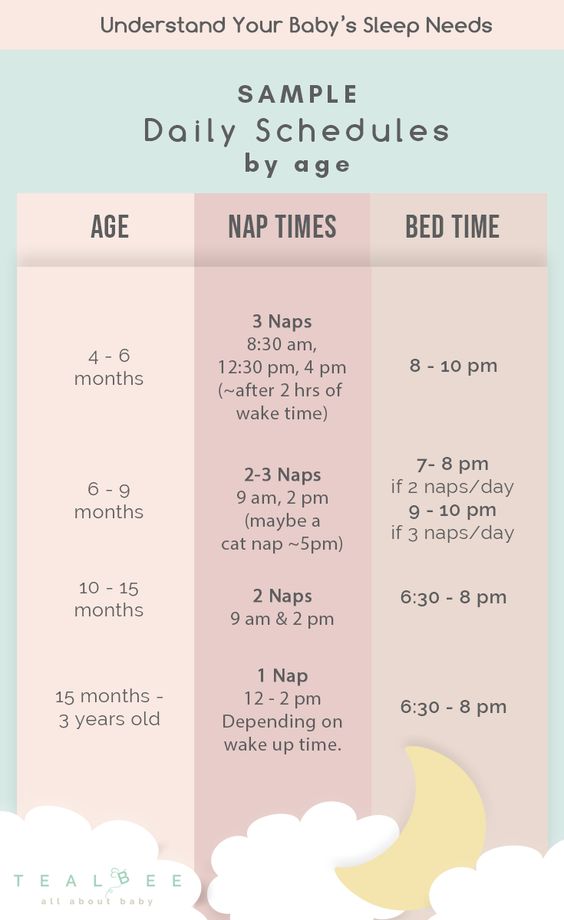 [Internet], "Four-month sleep regression: what it is and what to do about it." March 2014 [cited February 2018].
[Internet], "Four-month sleep regression: what it is and what to do about it." March 2014 [cited February 2018].
13 The Myth Of Baby Sleep Regressions – What’s Really Happening To Your Baby’s Sleep? [Internet]. Pinky Mckay ; December 2017 [ cited 2018 Feb ] - "The Myth of Baby Sleep Regression - What's Really Happening to Your Baby?" [Internet]. Pinky McKay, December 2017 [cited February 2018].
14 Kendall - Tackett K ET Al . The effect of feeding method on sleep duration, maternal well-being, and postpartum depression. Clinical Lactation . 2011;2(2):22-26. - Kendall-Tuckett K. et al., "Influence of feeding pattern on sleep duration, maternal well-being and the development of postpartum depression.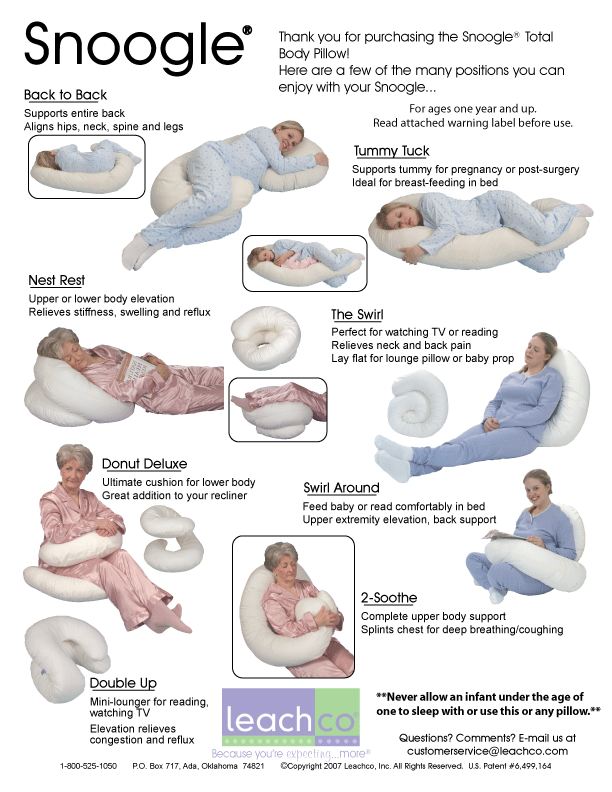 " Clinical Lactation. 2011;2(2):22-26.
" Clinical Lactation. 2011;2(2):22-26.
15) Harrison D et al. Breastfeeding for procedural pain in infants beyond the neonatal period. Cochrane Database Syst Rev . 2014;10. — Harrison D. et al., "Breastfeeding for Relief of Medical Pain in the Neonatal Period." Cochrane Database of System Rev. 2014;10:CD11248
16 Czank C et al. Retention of the immunological proteins of pasteurized human milk in relation to pasteurizer design and practice. Pediatr Res . 2009;66(4):374. - Zhank S. et al., "Retention of immunological proteins in pasteurized milk depending on the technique and practice of pasteurization". Pediatrician Res. 2009;66(4):374.
17 Weaning from the breast. (2004). Paediatr Child Health, 9(4):249–253. - "Weaning from the breast" (2004). Pediatrician Child Health, 9(4):249–253.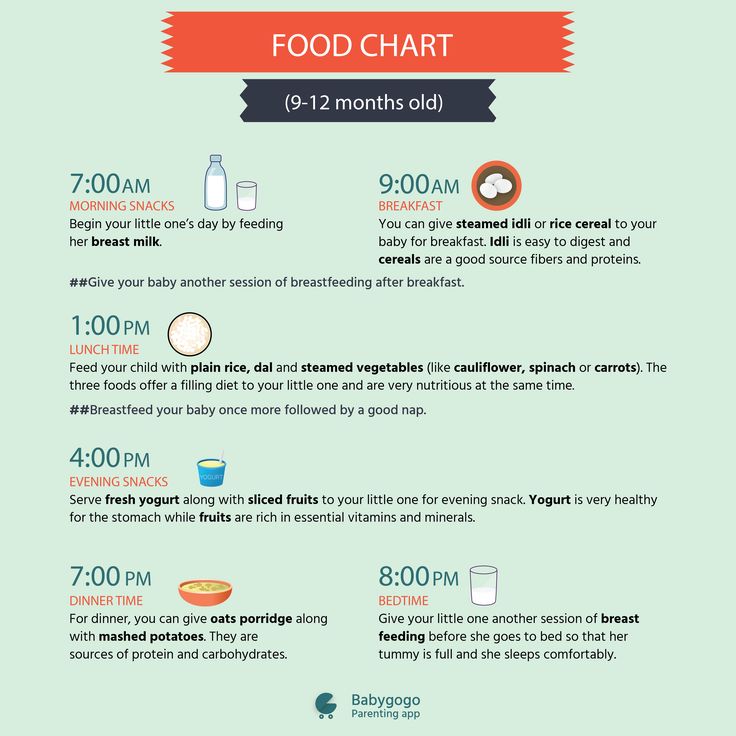
Should I feed my baby at night?
Sleep and nutrition
Each child has his own individual rhythm of sleep and nutrition, as well as individual need for them. Just in newborns in the first weeks of life, the ability to distinguish between day and night has not yet been developed. The child is simply not used to going without food for a long time. Indeed, in the womb, he could satisfy hunger at any time of the day or night. Therefore, at least in the first weeks, he will certainly wake you up at night for feeding.
If you are formula feeding your baby, unload yourself and take turns with your partner for nighttime feedings. It is also possible if you express milk in the evening and store it in the refrigerator (from +4°C to +6°C, closed for no more than 2 days). nine0003
After three months, your baby can go without food for longer, so he sleeps longer at night than during the day. Starting at about 6 months, babies no longer need nighttime feedings, as at this age the rhythm of hunger and satiety in a healthy baby stops at daytime.